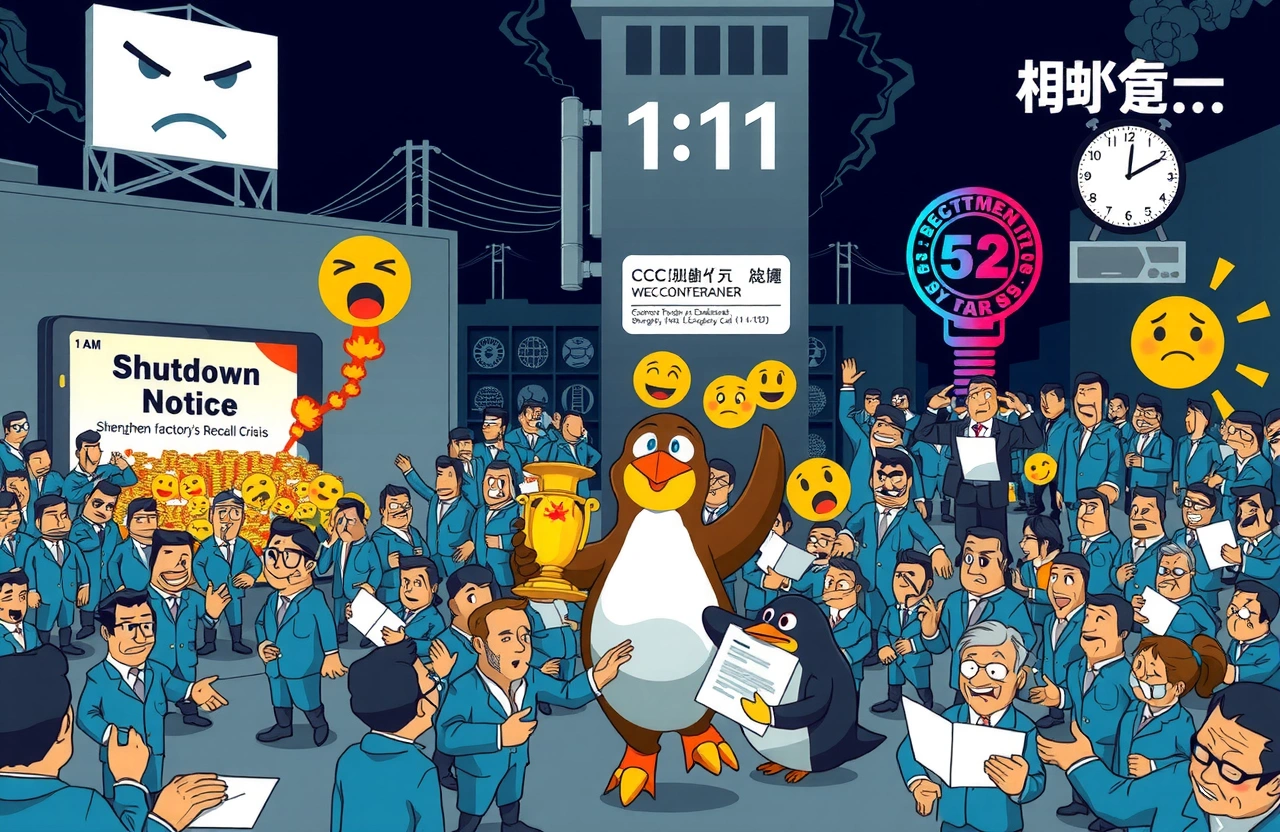A Midnight Bolt from the Blue
July 2025 witnessed corporate chaos in Shenzhen when Romoss Technology (罗马仕) plunged employees into uncertainty through a 1 AM announcement on Sunday, July 6. Workers who’d just completed their Friday shifts found themselves facing an immediate six-month shutdown without warning. The sudden operational halt came after weeks of turmoil following a product recall crisis, where reassigned staff endured daily customer abuse while handling complaint calls.
As over 1,000 employees awoke to this life-altering notification, the electronics manufacturer joined China’s growing list of companies facing abrupt disruption amidst regulatory tightening. This incident illuminates the fragile balance between corporate survival tactics and workforce protection during industrial crises – a dilemma increasingly common after China’s 3C certification overhaul. The silence before the storm was particularly jarring: productive Friday operations contrasted sharply with Sunday’s paralysis order.
Key Developments
– Employees report handling toxic customer interactions daily during recall crisis before shutdown
– Romoss management confirms limiting operations to recall teams only
– Six-month suspension follows failed attempts to secure renewed 3C certification
– Worker wages will drop to 80% of Shenzhen’s minimum wage after first month
– Legal experts identify multiple compliance risks in sudden shutdown procedure
The Midnight Notice That Changed Everything
Workers checking their internal communication platform (钉钉) at 1:11AM on July 6 encountered the coldly titled “Notice Regarding Suspension of Production Work”. This message outlined an immediate operational freeze across manufacturing divisions – effective in mere hours.
Official Timeline Breakdown
Employees received formal notification through the company’s enterprise platform precisely at:
1:11 AM July 6 — Notification of shutdown
July 7 — Operations cease
January 6 2026 — Initial restart date
The document stated Romoss would “strictly follow Guangdong Wage Payment Regulations.” This translated to:
– Full regular wages during August (first month)
– September onward: 80% of Shenzhen’s minimum wage (currently ¥2,360/month)
– Social security deductions recalculated at minimum wage levels
Former production line technician Li Ming (李明) shared: “We scrambled throughout Friday meeting targets, then BOOM—total collapse Sunday morning. Even our supervisors seemed unaware.”
Recall Teams: The Sole Survivors
The notification clarified that only employees handling the product recall would remain active. This small group faced overwhelming pressure: Romoss had been battling a flood of returns since their popular power banks failed safety certification in June.
A Romoss manager who requested anonymity stated: “There’s been catastrophic product returns recently. This sudden operational halt became inevitable after government discussions stalled. We hope 3C recertification might revive operations sooner than projected.”
Inside the Employee Rollercoaster
Worker testimonies reveal escalating distress across the crisis timeline – from initial recall challenges to shutdown despair. Production veteran Wang Hao (王浩), abruptly reassigned to customer support during the recall, described deteriorating conditions:
The Recall Grind
“Remembering those recall shifts still knots my stomach\” Wang admitted. “Management pulled people from every department—engineering, logistics, even maintenance—to handle customer calls. We didn’t receive proper training.”
The haphazardly assembled support team faced overwhelming consumer fury:
• 14-hour shifts including weekends
• Constant customer insults
• Compressed 30-minute meal breaks
• No additional compensation beyond base salary
“Customers screamed about exploding batteries and demanded refunds immediately,\” Wang recalled. “When I couldn’t process claims instantly, they’d curse my family lineage.”
Shifting Management Structures
Mid-level supervisors noted worrying corporate patterns emerging months before the shutdown:
– Management reshuffles every 2-3 months post-March
– Disappearance of executive leadership
– Decreasing production floor temperatures as ventilation budget vanished
– Gradual reduction in cafeteria food quality
“The company felt adrift,” described quality control lead Zhou Ying (周颖). “No CEO appearances since spring. Department heads changed constantly—we’d report to three different bosses within 60 days.”
Emotional Turbulence
Veteran employees expressed conflicted emotions about Romoss—once celebrated for affordable power solutions. Production specialist Chen Wei (陈伟) summarized:
“Witnessing this downfall hurts deeply. Our products gave millions affordable charging solutions. But this recall proves we compromised too far on quality control—and consumers paid the price.”
As Chen packed his workstation July 7, he added pensively: “After seven years building Romoss products, I hope for revival—but reality says it’s over.”
Behind Management’s Closed Doors
Corporate leadership maintained optimistic messaging until the shutdown became unavoidable. On July 3—just 72 hours before freezing operations—CMO Zhang Lei commented publicly:
“This industry transformation arrived brutally suddenly. We navigate unprecedented hardship, yet persist onward.”
His statement referenced Romoss’ 13-year market presence and recent brand revitalization efforts. Privately, executives conceded deeper structural problems.
Recertification Race Against Time
Information surfaced regarding frantic efforts to regain mandatory 3C (China Compulsory Certification) approval following the recall:
• Dedicated team submitting compliance documentation
• Continuous regulator discussions since June
• Revised technical specifications verified
• Production restart awaiting final certification
One executive source insisted: “Once certification clears, operations resume immediately—and no 2-3 year hiatus.”
The Echoes of Industry Transformation
The CMO’s “industry transformation” reference acknowledged China’s expanding electronics regulations:
– Enhanced certification pathways
– Stricter production environment audits
– Heftier non-compliance penalties
– Increased scrutiny on lithium-ion battery safety
Unlike previous eras where manufacturers operated expansively, Romoss’ sudden operational halt exemplifies the new normal: companies ignoring regulations face extinction.
Legal Minefields
Beijing Jingrui Law Firm Chengdu labor specialist Liu Chengdong (刘诚冬) identified critical legal considerations from Romoss’ shutdown approach.
Compliance Analysis
The lawyer acknowledged lawful foundations for operational suspensions —but highlighted procedural deficiencies:
– Wage calculation adheres to Guangdong regulations
– Missing OSHEC hazard notifications
– Insufficient prior employee consultation
– Collective bargaining opportunities ignored
Emerging Conflict Areas
Several practices invited labor disputes:
• Social security recalculation
• Delayed termination compensation
• Regulatory hazard communication gaps
• Failure establishing worker representative committee
“Romoss maintains legal footing regarding wage payments,\” Liu explained. “However, reducing social security contributions contravenes original employment terms affecting long-term pension benefits—and potentially triggering lawsuits.”
He cited Article 35 of Labor Contract Law requiring negotiation before material contract amendments. Romoss issued notice unilaterally, bypassing mandatory consultations.
Broader Business Implications
This sudden operational halt offers cautionary lessons across Chinese manufacturing:
Regulatory Realignment
Modern enterprises must adapt strategy around evolving compliance environments:
• Increased certification budget allocation
• Dedicated regulatory affair departments
• Proactive production process auditing
• Continuous materials documentation
Acceptable shortcuts five years ago cause enterprise fatalities today. Firms ignoring certification reforms risk identical sudden shutdown scenarios.
Labor Relationship Management
Beyond minimizing legal exposure, companies should foster trust:
– Transparent communication regarding challenges
– Collective negotiation protocols
– Documented income protection guarantees
– Workplace morale preservation initiatives
Ignoring employee relations transforms temporary downturns into permanent brand damage.
Liu Chengdong concluded: “This wasn’t fundamentally about labor law—it’s about values. Businesses forgetting their workforce amidst crises shred their social contract.”
Survival Lessons From a Corporate Collapse
As Romoss workers tentatively await potential reactivation fixtures
near January 2026, China’s manufacturing ecosystem absorbs critical insights:
The electrical accessories pioneer built market presence on accessibility—bringing affordable power solutions to millions. Ultimately, sacrificing compliance and quality assurance for margin protection created fatal vulnerability.
For professionals navigating turbulent industrial climates, fundamental priorities emerge:
• Regulatory compliance precedes profit margins
• Workforce communication prevents chaos
• Reserve capitalization cushions shocks
• Diversification protects against certification failures
As factory gates remain locked while recall teams field dwindling customer complaints, Romoss’ legacy echoes beyond Shenzhen’s manufacturing district: no company survives ignoring compliance responsibilities and employee wellbeing concurrently.
Business leaders nationwide now face urgent reassessments—verify certification status before regulators come knocking, establish transparent crisis communication frameworks, and prioritize employee dignity during operational drought seasons. The midnight announcement heard across Romoss should awaken proactive preparation—not reactive desperation.




